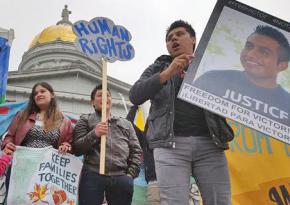Victor Diaz is still fighting for justice
Victor Diaz is a dairy farmworker and immigrant rights activist based in Vermont. He was detained by undercover ICE agents in April and held for two weeks after representing Vermont farmworkers at a national gathering of the Food Chain Workers Alliance in Los Angeles. Activists led by Migrant Justice and Juntos, the Migrant Justice student group, organized a campaign to win Victor's release, and in early May, the judge assigned to his case set bail at the lowest possible amount, ensuring that he would get out of detention. But the struggle continues since he still faces deportation proceedings.
Kelsey Aaron of UVM Juntos and John Godfrey talked with Victor about how he got involved in the struggle and what lies ahead for him after his ICE detention.
HOW DID you first get involved with Migrant Justice?
I GOT involved in Migrant Justice because the farm owner I worked for didn't want to pay me my wages. We organized, and I got my stolen wages back.
He had us living in a camper. There were four of us packed in this one camper, sharing the space. It really only fit two of us at once, so we basically had to be inside in shifts. Two of us could be inside, while the other two were working, and then when they got off their shift, we would have to switch.
It was a difficult life because we didn't have enough space--we didn't have any privacy. There wasn't any space to cook in the camper so we had to cook all of our meals in the farm's front office, where everybody was passing through, coming in to inspect the milk and stuff like that. We had to wash our dishes in the farm's cooler right next to the milk vats.
In the winter, there wasn't any heat so everything would freeze. In the summer, it was too hot. The roof leaked when it rained, and so the farm owner threw a tarp over it, but that blocked the air conditioner, so we didn't have AC.

So after two years, my coworkers and I organized to pressure the farm owner to get us a trailer to move into. He finally gave in and got us a trailer, but then the final straw came when the sewage water started coming out through the pipes. No human being should have to live like that. That was when we said, "We've had it" and we left.
The problem was that this farm owner would keep everyone's first paycheck as insurance so they wouldn't leave. I told him that that wasn't his money. I was very nice about it, but this was stolen money. We earned it, and he has to give it to us.
He didn't like that, so we called Migrant Justice and we basically said to him that if you don't resolve the problem, then we're going to have to come back with more people and do an action at your farm. He didn't pay, so with Migrant Justice, we organized a group of people--volunteers, churchgoers, Middlebury students, Burlington residents--and came down and confronted the farm owner to support me as I went and demanded the wages that had been illegally withheld. With all that pressure, we were able to get the farmer to pay.
We saw that there's power in numbers, power in unity, because with all of us together we got the stolen wages back. That's how we got involved in the organization and we started learning about the other fights that were going on: for drivers' licenses, against discrimination.
It's a process of educating ourselves as a community--that things aren't as they should be on the farms and that things can be different. That's what inspired me to get involved, and I started going to assemblies, to meetings, to open my ears to what was going on. That's how I became involved.
WHY DO you think that ICE has targeted you?
I WAS charged with a DUI a while ago. I don't want to go into details of the case because it's still going through the courts. The whole incident was tinged with racism. They knew I wasn't intoxicated, but they charged me anyway.
What other people have said--and what I'm thinking--is that there are some people who don't like the type of work I do. They don't like my activism, they don't like when people stand up for themselves, when people stand up for their rights, when people join together to demand justice. I think that probably has something to do with it.
HOW HAS being detained by ICE affected you?
BEING DETAINED hasn't held me up at all. I'm still in the struggle, still fighting to make sure that we can win the human rights that we deserve.
Right now, I'm producing a video that we will share with others about what to do if they're in a situation like what happened to me--what to say, what not to say, what sort of precautions to take.
I'm also going out and representing the organization, and taking part in conversations around the country. Just two days ago, I was down in Connecticut where I was part of a conference talking about creating a just transition in our food systems to fair food, and talking about workers movements in the food industry.
WHAT CAN people do to support you?
THE FIRST thing that we are asking people to do is to sign on to the petition to stop my deportation. That's really a first step. If that's not successful, then we'll be having other calls for action. There's been a lot of support from people all over who have called me and written me asking what they can do to help. So I'm very hopeful.


